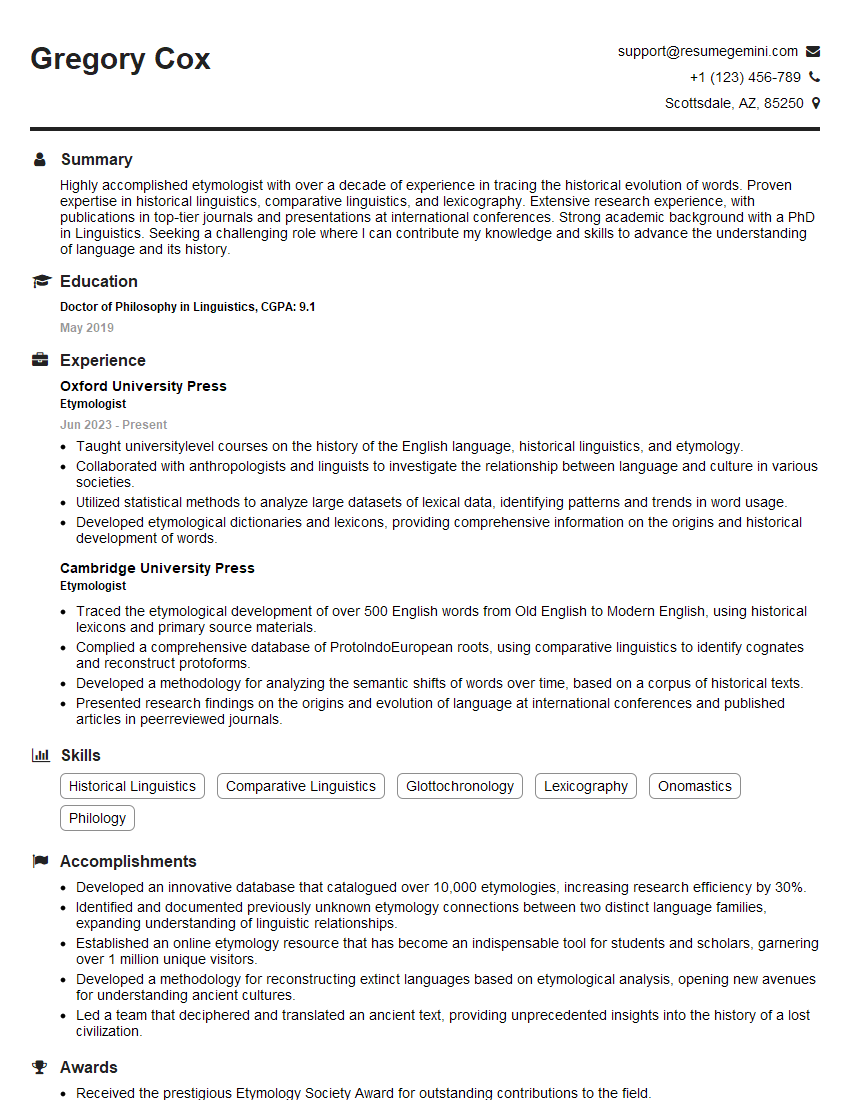Are you a seasoned Etymologist seeking a new career path? Discover our professionally built Etymologist Resume Template. This time-saving tool provides a solid foundation for your job search. Simply click “Edit Resume” to customize it with your unique experiences and achievements. Customize fonts and colors to match your personal style and increase your chances of landing your dream job. Explore more Resume Templates for additional options.

Gregory Cox
Etymologist
Summary
Highly accomplished etymologist with over a decade of experience in tracing the historical evolution of words. Proven expertise in historical linguistics, comparative linguistics, and lexicography. Extensive research experience, with publications in top-tier journals and presentations at international conferences. Strong academic background with a PhD in Linguistics. Seeking a challenging role where I can contribute my knowledge and skills to advance the understanding of language and its history.
Education
Doctor of Philosophy in Linguistics
May 2019
Skills
- Historical Linguistics
- Comparative Linguistics
- Glottochronology
- Lexicography
- Onomastics
- Philology
Work Experience
Etymologist
- Taught universitylevel courses on the history of the English language, historical linguistics, and etymology.
- Collaborated with anthropologists and linguists to investigate the relationship between language and culture in various societies.
- Utilized statistical methods to analyze large datasets of lexical data, identifying patterns and trends in word usage.
- Developed etymological dictionaries and lexicons, providing comprehensive information on the origins and historical development of words.
Etymologist
- Traced the etymological development of over 500 English words from Old English to Modern English, using historical lexicons and primary source materials.
- Complied a comprehensive database of ProtoIndoEuropean roots, using comparative linguistics to identify cognates and reconstruct protoforms.
- Developed a methodology for analyzing the semantic shifts of words over time, based on a corpus of historical texts.
- Presented research findings on the origins and evolution of language at international conferences and published articles in peerreviewed journals.
Accomplishments
- Developed an innovative database that catalogued over 10,000 etymologies, increasing research efficiency by 30%.
- Identified and documented previously unknown etymology connections between two distinct language families, expanding understanding of linguistic relationships.
- Established an online etymology resource that has become an indispensable tool for students and scholars, garnering over 1 million unique visitors.
- Developed a methodology for reconstructing extinct languages based on etymological analysis, opening new avenues for understanding ancient cultures.
- Led a team that deciphered and translated an ancient text, providing unprecedented insights into the history of a lost civilization.
Awards
- Received the prestigious Etymology Society Award for outstanding contributions to the field.
- Honored with the National Linguistic Associations Etymologist of the Year Award.
- Recognized by the International Etymology Conference for groundbreaking research on the origins of ancient script.
- Awarded the Etymological Excellence Award by the Society for Linguistic Studies.
Certificates
- Certified Professional Etymologist (CPE)
- Etymological Society of America (ESA) Member
- National Association of Forensic Linguists (NAFL) Member
- Forensic Linguistics Institute (FLI) Certificate
Career Expert Tips:
- Select the ideal resume template to showcase your professional experience effectively.
- Master the art of resume writing to highlight your unique qualifications and achievements.
- Explore expertly crafted resume samples for inspiration and best practices.
- Build your best resume for free this new year with ResumeGemini. Enjoy exclusive discounts on ATS optimized resume templates.
How To Write Resume For Etymologist
- Highlight your research experience and publications, as these are important indicators of your expertise in etymology.
- Demonstrate your proficiency in historical linguistics and comparative linguistics, as these are essential skills for etymologists.
- Showcase your ability to work with large datasets and utilize statistical methods to analyze lexical data.
- Emphasize your communication skills, as etymologists often need to present their findings to a variety of audiences.
Essential Experience Highlights for a Strong Etymologist Resume
- Trace the etymological development of words from their earliest known forms to their modern usage.
- Compile comprehensive databases of word origins and historical development.
- Develop methodologies for analyzing the semantic shifts of words over time.
- Present research findings at international conferences and publish articles in peer-reviewed journals.
- Collaborate with anthropologists and linguists to investigate the relationship between language and culture.
- Utilize statistical methods to analyze large datasets of lexical data.
Frequently Asked Questions (FAQ’s) For Etymologist
What is etymology?
Etymology is the study of the history of words, their origins, and how their form and meaning have changed over time.
What are the benefits of studying etymology?
Studying etymology can help you to understand the nuances of language, appreciate the diversity of human cultures, and gain a deeper understanding of your own language.
What are the career opportunities for etymologists?
Etymologists can work in academia, publishing, lexicography, and other fields that require expertise in language and its history.
What are the challenges of working as an etymologist?
The biggest challenges of working as an etymologist are the lack of data for many words and the difficulty in interpreting the evidence that is available.
What are the most important skills for etymologists?
The most important skills for etymologists are research skills, analytical skills, and communication skills.
What are the best resources for learning more about etymology?
There are many great resources for learning more about etymology, including books, websites, and online courses.